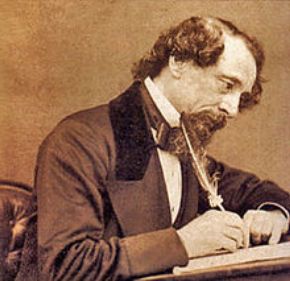Not on your life, asseverated G. K. Chesterton, as noted in a Literary Digest article (“Dickens Not a Socialist,” April 3, 1909). Of course, in his own idiosycratic way Chesterton wouldn’t tolerate conservatives (deprecatingly called “individualists” in those days) any more than socialists:
MR. CHESTERTON has been violently protesting of late against the somewhat frequent assertion that Dickens was a Socialist. The great novelist of democracy had been assigned to that fold, which some seem to think embraces all philanthropic souls, by Mr. Edwin Pugh, his latest biographer. Mr. Chesterton reviewed the biography [Charles Dickens: The Apostle of the People (1908)] in a London paper, and now the two are at loggerheads over the question, one trying to push Dickens into the Socialist camp, the other trying to drag him back.
“Mr. Pugh thinks that the democratic sentiment, obviously strong in Dickens, amounted to amoral sympathy with what is called Socialism,” says Mr. Chesterton in the London Daily News (February 27). His own reply is that “obviously enough,” “there is nothing especially democratic about Socialism.” This is of course one of Mr. Chesterton’s diverting side-steps; but in taking it he tries to indicate what the position of Dickens really was.
We read: “Socialism (I could repeat it as schoolboy much better than my Greek iambics) is the assumption by the State of all the means of production, distribution, and exchange. The State might be a despotic State; it might be an aristocratic State; it might be a papal State. But if it owned and distributed all essential capital it would be a Socialistic State. I am quite well acquainted with all the sound arguments which connect such a State with unity or efficiency or progress; but I can not see what connects it with Dickens. Socialism would certainly stop the present anarchy; but Dickens did not especially object to anarchy. Dickens objected to tyranny; and a good half of the tyrants he denounced were Socialist tyrants; that is State and municipal tyrants. I pointed out that Bumble and Mr. Tite Barnacle were officers of State appointment, paid and controlled by the Commonwealth, and were therefore in the ultimate sense Socialists. To this Mr. Pugh replies ‘they were nothing of the kind; they were flunkies.’ Quite so; but why is it unsocialistic to be a flunky—so long as you are a State flunky? The State might own the means of production, and still desire, in a passion of poetic maternity, to produce flunkies. The State might own the means of distribution, and still manage, with the most exquisite efficiency, to distribute flunkies. The King’s flunkies are national flunkies. The Lord Mayor’s flunkies are municipal flunkies. What conceivable reason have we for supposing that the mere fact of wages being paid out of the treasury would eliminate precedence or servility, when we know that these things are rampant among the very people who are paid out of the treasury? Of course, one may be a Socialist and wish it to be democratic. My friend Mr. Donaldson wishes it to be Catholic; another friend (whom I will not name) wishes it to be polygamous. But Socialism, as such, is not polygamous, is not Catholic, and is not democratic. Socialism is simply the proposal that the Government, instead of taxing all property equally or unequally, should secure all property, and distribute it equally or unequally. And when it comes to the next [British prime minister Lord Robert] Cecil (who will show a marvelous talent for military analysis) or the next Churchill (who will have made the subject of Australia his own) I think you will find that the distribution will be unequal; that the dreary history of human jobbery will be drearily renewed. You will say, ‘But they can vote against the Cecil if they like.’ I answer, with some sadness, ‘But they could do that now.'”
The matter is worth the pause of a moment, Mr. Chesterton asserts, “because Dickens is one of the few full and undivided voices that remain to us; one of the few men who speak simply and strongly out of their own feelings, which are the final facts.”
Further: “He was neither a Socialist nor an Individualist, which is certainly worse. He was a man who saw that men abused their advantages over men’; the advantage of having wit, like Mr. Skimpole, the advantage of having whiskers, like Mr. Mantalini, the advantage of having rank, like Sir Leicester Deadlock, the advantage of having money, like Mr. Bounderby, the advantage of being a Socialist official, like Mr. Tite Barnacle or Bumble. That is the true instinct of Liberalism; the instinct of potential revolt; the instinct of splendid and immortal suspicion. Whatever will be powerful may be tyrannical; we shall remember that, and you have not heard the last of us. After all Socialist legislation there will remain a certain organ, a large and watchful eye, the great satiric eye of Dickens, which will see the face of Barnacle as plainly among your Socialist officers as it now sees the face of Gradgrind among your anarchist employers.”

